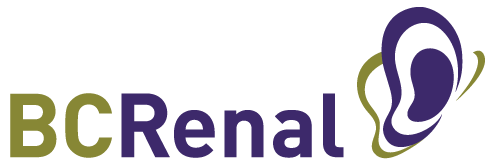
A study recently published in the
Canadian Journal of Kidney Health and Disease evaluated a four-year BC Renal initiative to support palliative care discussions, shedding light on particularly successful aspects of the program.
Kidney disease can be a progressive condition that involves significant decisions for patients in the more advanced stages, depending if they want to pursue possibly life-sustaining treatment or focus purely on symptom management for end of life. It is therefore important that health care providers clearly communicate the different options available to patients, and ensure each patient receives care that aligns with their personal wishes and values.
BC Renal carried out the Integrated Palliative Nephrology project between 2018 and 2022. The initiative provided a multi-pronged approach to bolster advance care planning skills of kidney care providers, for example by providing education, resources, and mentorship training.
“We wanted to make sure that health care providers are making the time for these conversations and feel confident, competent and comfortable in doing so,” explains Helen Chiu, BC Renal's quality lead for patient-centred performance improvement, who was involved in the study.
To evaluate the project, the study team gathered feedback from 90 kidney care providers through a survey, 32 through focus groups, and 15 through one-on-one interviews. Participants included social workers, nephrologists, pharmacists, nurses, and dietitians.
The results show that the Integrated Palliative Nephrology project generally had a positive impact. Approximately 60% of kidney care providers “agreed” or “strongly agreed” their knowledge about advance care planning had increased over the duration of the initiative. Almost half (48%) “agreed” or “strongly agreed” their ability to have advance care planning discussions with their patients and family members had improved. As well, mentorship and educational resources were identified as key factors that helped care providers feel more comfortable engaging in these discussions with their patients.
Of note, there was some lack of awareness among care providers over who is responsible for advance care planning discussions. “The nephrologist is generally seen as the quarterback who should initiate these conversations with patients, but all members of the multidisciplinary care team tend to see themselves as having a role in the conversations, so teams may need to sort out how they can share that responsibility,” says Chiu.
Salma Wadhwania, BC Renal project manager for home therapies and palliative care, helped lead the focus groups and interviews, and was also involved in the study. She says, “Based on the results, it became very clear to us that educational materials were considered a significant support for kidney care providers.”
This prompted the BC Renal Palliative Care Committee to create a comprehensive guide to further support engaging in advance care planning with patients. The guide is now available on the BC Renal website.
She adds, “We also followed up to identify local champions across the regional health authorities, so the project has had a number of positive outcomes to help advance palliative care efforts across BC.”
Guide:
Integrative Palliative Nephrology Resource Guide

